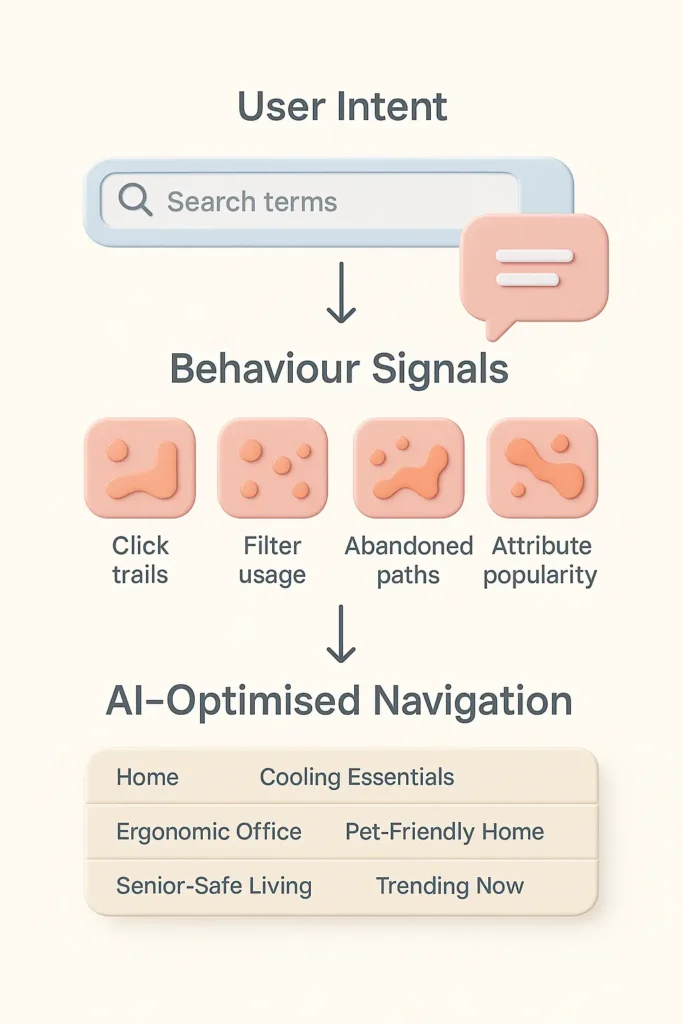
E-commerce in Singapore is evolving quickly – and if we’re honest, it’s one of the key areas that follows its homeland’s economic reputation. But there’s a problem – competition is big and many SMEs struggle to keep up with the pace. In many cases, small online shops still plan their collections based on intuition. Navigation structures expand because “we’ve always done it this way”. Thanks to AI e-commerce SEO, big and small businesses can stop relying on instinct alone and instead build their stores around actual keyword demand backed by real behavioural data.
Playing the guess game in e-commerce often leads to launching entire product ranges without even checking whether Singaporeans are actually searching for them. And if you think about it, this sits contrary to Jay Abraham’s long-standing philosophy: never operate on assumptions when you have the option to operate on intelligence. AI SEO services finally give us the tools to execute that principle with precision – especially for Singapore’s unique e-commerce landscape.
Why AI-Driven Merchandising Actually Matters
Merchandising has been heavily reliant on “gut feeling” for years. Even with the right strategy, business owners and SEO experts had to rely on instinct, which is valuable, but not scalable. Besides, it’s not predictable and certainly not measurable. Such cases often lead to reduced usability of navigation menus, collections that reflect internal preferences rather than customer search patterns. High-potential categories often remain undiscovered because no one is looking at the data – a direct result of structuring entire e-commerce stores around guesswork.
AI ecommerce SEO brings clarity by simply helping business owners align their strategies with genuine market demand. Instead of asking “What do we want customers to buy?”, companies start prioritising questions like, “What are customers already trying to find?” Such a fundamental shift can quickly transform the revenue trajectory for any SME, with the potential to garner a 91% increase in monthly organic revenue within 8 months with data-driven keyword targeting.
How AI Impacts E-Commerce (The Practical Version)
AI has surely faced criticism in marketing and merchandising. But in the spirit of Jay Abraham’s The Sticking Point Solution, it really fits the narrative of practicality. Instead of talking about AI as a fluffy buzzword, such tools can shape any e-commerce in Singapore and beyond. Jay Abraham has been teaching continuous optimisation for decades – AI simply gives e-commerce teams the means to apply it daily, impacting modern businesses in 3 ways:
AI Helps You Build Collections Based on Real Demand

When you use keyword intelligence properly, you uncover category opportunities that humans rarely think of on their own.
Instead of generic collections like:
- Bedroom Essentials
- Home Office
- Kitchen & Dining
AI surfaces demand clusters such as:
- “cooling bedsheets Singapore”
- “ergonomic office chairs small rooms”
- “kitchen safety items for elderly”
- “pet-friendly sofa materials”
Best of all, these aren’t random guesses, but how people actually search.
This is exactly the purpose of doing proper AI keyword research, because demand-led categories outperform assumption-led ones every time.
AI Reveals Category Gaps Before Sales Drop
One of the biggest benefits of AI ecommerce SEO Singapore is the ability to spot what’s missing before it becomes a revenue leak.
Search engines already tell you:
- Which topics are trending
- Which subcategories competitors are capturing
- Which product attributes shoppers care about
- Which pages get impressions but no clicks
AI ties this information together and points to missing category pages – something that often becomes clearer when you apply the principles behind keyword gap analysis.
This reduces lost traffic, missed opportunities, and invisible bottlenecks.
AI Reorganises Navigation Based on Actual User Behaviour

If you’ve ever wondered why customers “just don’t find things”, here’s why:
The navigation menu mirrors how your team thinks, not how customers search.
AI fixes this by reading:
- Click trails
- Filter usage
- Abandoned category paths
- Attribute popularity
- Seasonal intent shifts
- Keyword clusters with strong commercial intent
What you get is a tight, intuitive navigation that reflects real-life discovery patterns.
A Practical AI Merchandising Workflow for Singapore SMEs
If you’re running lean teams (like most SMEs), AI can tilt the odds in your favour without requiring extra costs or workforce. Whether you integrate an AI chatbot to boost online conversions or use tools for automated trend forecasting and inventory planning.
Step 1: Use Demand-First Keyword Insights
Look for what Singaporeans are actively searching:
- “non slip bathroom mats elderly”
- “humid weather skincare Singapore”
- “durable school bags primary kids”
These reveal the real intent behind purchases.
Step 2: Map Products to Search Intent
AI tags each product based on:
- attributes
- materials
- use cases
- search behaviour
- semantic patterns
This becomes the backbone of dynamic collections.
Step 3: Build Collections Around Solutions, Not Seasons
AI allows you to launch collections like:
- Cooling Essentials for Humid Weather
- Ergonomic Home Office Solutions
- Senior-Safe Living
- Pet-Friendly Home Materials
These convert better because they reflect the language customers use on Google.
Step 4: Optimise Navigation Beyond “Best Sellers”
AI restructures navigation based on:
- What customers actually click;
- What appears most in search;
- What drives conversion;
- What attributes matter most.
This reduces clutter and improves ranking at the same time.
Step 5: Review and Optimise Monthly
The old set-and-forget marketing approach does not work anymore.
AI allows for effortless and regular optimisation for:
- category relevance
- trending queries
- search competitiveness
- internal linking paths
- product-level SEO
This approach is also reinforced by the logic behind many of the best AI SEO apps adopted by advanced e-commerce brands.
Real-World Scenario (Composite Example from SG Retail Data)
A Singapore lifestyle brand struggled with stagnant sales. Their collections were generic, and customers often couldn’t find what they needed.
AI Findings
- Rising demand for “ergonomic chairs Singapore”
- Surge in searches for “cooling bedsheets Singapore”
- High impressions for “pet-friendly sofa fabric” but zero related collection
- No pages targeting “senior-safe home items”
What Changed
- New demand-driven collections built;
- Navigation reorganised around primary search clusters;
- Product tags rewritten based on AI-derived attributes;
- Redundant categories removed.
Results
- Significant boost in organic searches (281% increase in monthly organic clicks);
- Increase in add-to-cart rate (30% uplift in open rates for abandoned cart emails);
- New collections ranking within months (a surge of 3,403% within nine months);
- Clearer path to product discovery.
This is the difference between an e-commerce store that “adds categories” and one that merchandises with intent.
Getting Started: Practical Wins for Singapore SMEs
Here’s where I’ll be honest – most SMEs don’t need complicated AI systems to begin. They need clarity, a proper framework, and a commitment to stop running ecommerce on hope alone.
Start with:
- Building collections based on keyword demand
- Allowing AI to flag missing pages
- Tagging products with search language
- Organising navigation based on intent, not guesswork
- Reviewing your structure monthly
This approach aligns naturally with how many AI SEO services in Singapore strengthen e-commerce sites – by tying merchandising and search demand together.
Final Thoughts and How Leading Solution Can Help
AI e-commerce SEO gives Singapore SMEs something they’ve been missing for years: visibility into what customers really want.
And once you build collections and navigation around genuine demand, everything improves — product discovery, rankings, conversion rates, and the overall clarity of your ecommerce strategy.
If you’d like guidance applying this to your store — from keyword analysis to navigation restructuring and AI SEO planning — we’d be happy to help.


